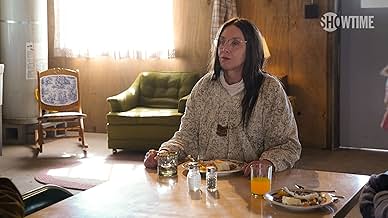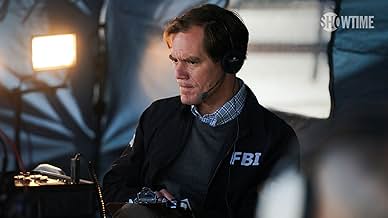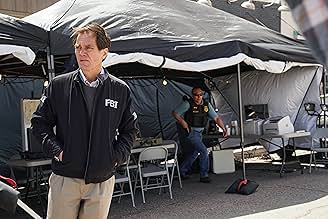Les séquelles douloureuses de la confrontation désastreuse de Waco dans l'enceinte de Branch Davidian - un événement qui a stimulé les mouvements miliciens américains et contribué à radicali... Tout lireLes séquelles douloureuses de la confrontation désastreuse de Waco dans l'enceinte de Branch Davidian - un événement qui a stimulé les mouvements miliciens américains et contribué à radicaliser Timothy McVeigh et Terry Nichols.Les séquelles douloureuses de la confrontation désastreuse de Waco dans l'enceinte de Branch Davidian - un événement qui a stimulé les mouvements miliciens américains et contribué à radicaliser Timothy McVeigh et Terry Nichols.
Parcourir les épisodes
Avis à la une
Seeing reviews that this shows the Branch Davidians as "innocent anti-heroes" and that the FBI/ATF and the authorities in general are being shown negatively. Not only is this not true (the show frequently criticizes the surviving Branch Davidians, for one), but even if it were true that would only be testament to how evil the government acted. What this show does not do is what many, including the government, tried to do which is blanket label them all crazy suicidal murderers and unfairly (an unfairness that was proven in court) convict them on this basis.
I highly recommend you give this show a watch only after finishing the first series as it will provide much context that I'm not certain many people have if they never watched it/forgot important details.
I highly recommend you give this show a watch only after finishing the first series as it will provide much context that I'm not certain many people have if they never watched it/forgot important details.
I knew about Waco but never paid attention to the mind-blowing information that came to light afterward.
I thought this series did a fantastic job of explaining the views of all sides. Waco and Waco: The Aftermath should be mandatory viewing for high schoolers.
As someone else said, the self-serving rules Karesh made re. Sex could have been covered more thoroughly. Karesh made a rule against anyone else having sex, even married couples. But he was allowed to have sex and impregnate even very young girls. That situation did warrant government intervention.
As the series explained, the ATF and the FBI used competing tactics to extract the members. The results were tragic.
I thought the actors were all well cast and they did a great job. There were many facets to this story, but it was all easy to follow.
I think the show is a perfect example of how to shed light on how our government and courts really work.
I thought this series did a fantastic job of explaining the views of all sides. Waco and Waco: The Aftermath should be mandatory viewing for high schoolers.
As someone else said, the self-serving rules Karesh made re. Sex could have been covered more thoroughly. Karesh made a rule against anyone else having sex, even married couples. But he was allowed to have sex and impregnate even very young girls. That situation did warrant government intervention.
As the series explained, the ATF and the FBI used competing tactics to extract the members. The results were tragic.
I thought the actors were all well cast and they did a great job. There were many facets to this story, but it was all easy to follow.
I think the show is a perfect example of how to shed light on how our government and courts really work.
Overall the acting and the storytelling is great. But I've read a good deal about Waco and the writing is very one sided. While the writers are painting the FBI/ATF and the authorities in general in an accurate negative light, they certainly are making the Branch Davidians look like innocent anti-heros. They are glossing over a great deal of the insanity that was taking place there.
I will be honest, if it wasn't for the actors I would have stopped watching by now. But they really do a great job. And the writing style and storytelling is very intriguing and keeps you interested. I just wish they were taking a more equal stance.
I will be honest, if it wasn't for the actors I would have stopped watching by now. But they really do a great job. And the writing style and storytelling is very intriguing and keeps you interested. I just wish they were taking a more equal stance.
I didn't realize this series was in connection with 2018's mostly forgettable "Waco". I found "Aftermath" much more intriguing.
Serving as both a prequel and sequel to "Waco", it tells parts of the story that are less known and which might raise more difficult (and sadly relevant) questions than the story of the actual raid and stand-off can, at least for anyone who's already familiar with the story. Unfortunately, the creators don't want to get messy enough to fully wrestle with the bigger questions it almost raises.
The strongest part of the series is the courtroom drama conspiracy trial of surviving Koresh followers. Ribisi, a perennially underappreciated actor, offers the most compelling portrayal in the series as the survivors' defense attorney. As a reported scientologist in real life, it's a little ironic that Ribisi's character is at times both defensive and accusatory of his clients regarding their blind devotion to Koresh as a cult leader.
The prequel portion of the series, the Koresh origin story, is pretty hokey. Brief snippets from "Waco" and Taylor Kitsch's portrayal of Koresh (whose performance was one of that series's strengths) only further expose the weaknesses of Keean Johnson's immature performance. And asking the audience to believe that Johnson somehow physically transformed into Kitsch in only a few short years is a pretty big ask.
But Michael Shannon, reprising his role as FBI agent Gary Noesner, is surprisingly one of the weakest links of the series. He seems to be mostly sleepwalking through this one. Maybe his character is tired from all the sleepless nights after his involvement at Waco? Whatever the case, it doesn't really work here and his scenes tend to drag the story down.
As for the McVeigh/Nichols interjections, they're thematically and historically important as far as the fallout of Waco is concerned, but they often feel like afterthoughts instead of aftermath.
The series tries its hardest to humanize everyone involved-perhaps even those who arguably don't deserve to be humanized-in order to show that labeling enemies as "evil" only leads to more violence and destruction. Fair enough. But it's a little too neat to reduce the lessons of Waco to "can't we all just get along?"
Serving as both a prequel and sequel to "Waco", it tells parts of the story that are less known and which might raise more difficult (and sadly relevant) questions than the story of the actual raid and stand-off can, at least for anyone who's already familiar with the story. Unfortunately, the creators don't want to get messy enough to fully wrestle with the bigger questions it almost raises.
The strongest part of the series is the courtroom drama conspiracy trial of surviving Koresh followers. Ribisi, a perennially underappreciated actor, offers the most compelling portrayal in the series as the survivors' defense attorney. As a reported scientologist in real life, it's a little ironic that Ribisi's character is at times both defensive and accusatory of his clients regarding their blind devotion to Koresh as a cult leader.
The prequel portion of the series, the Koresh origin story, is pretty hokey. Brief snippets from "Waco" and Taylor Kitsch's portrayal of Koresh (whose performance was one of that series's strengths) only further expose the weaknesses of Keean Johnson's immature performance. And asking the audience to believe that Johnson somehow physically transformed into Kitsch in only a few short years is a pretty big ask.
But Michael Shannon, reprising his role as FBI agent Gary Noesner, is surprisingly one of the weakest links of the series. He seems to be mostly sleepwalking through this one. Maybe his character is tired from all the sleepless nights after his involvement at Waco? Whatever the case, it doesn't really work here and his scenes tend to drag the story down.
As for the McVeigh/Nichols interjections, they're thematically and historically important as far as the fallout of Waco is concerned, but they often feel like afterthoughts instead of aftermath.
The series tries its hardest to humanize everyone involved-perhaps even those who arguably don't deserve to be humanized-in order to show that labeling enemies as "evil" only leads to more violence and destruction. Fair enough. But it's a little too neat to reduce the lessons of Waco to "can't we all just get along?"
Overall I feel like the show missed a big opportunity to build on a lot of the conspiracy aspects of the Waco incident (think Waco: Rules of Engagement documentary meets The People v. O. J. Simpson,) and turned this into a incredible court room focused drama with some flashbacks. Ultimately this is 3 stories crammed into 5 episodes. The the trial of the Branch Davidians; Gary Noesner and his uncovering of para military groups; and David Koresh's origin story.
Each story feels quite thin and vague, either not enough time to properly flesh out the characters and backstory or there just really isn't much material to explore. The Gary Noesner plotline especially feels like filler and a quick way to try and bring tension and action.
Many one dimensional characters and stories throughout and the series is rapidly switching back and forth between them. Compared to season 1 which keeps us at Mount Carmel with our characters and only slight deviations, this is why I believe only focusing on the trial would have been more entertaining and engaging. There are some shining stand out moments though.
Right off the bat I have to mention Giovanni Ribisi as the lawyer representing the Branch Davidians, in every scene he's such an interesting actor to watch but we don't spend enough time with him and to appreciate his relationship with the Branch Davidians and see it grow.
The actor playing Branch Davidian Clive Doyle is totally believable and creates a sympathetic and human character, but again, it's a shame the series jumps about so much, we just never get to stay with them.
Each story feels quite thin and vague, either not enough time to properly flesh out the characters and backstory or there just really isn't much material to explore. The Gary Noesner plotline especially feels like filler and a quick way to try and bring tension and action.
Many one dimensional characters and stories throughout and the series is rapidly switching back and forth between them. Compared to season 1 which keeps us at Mount Carmel with our characters and only slight deviations, this is why I believe only focusing on the trial would have been more entertaining and engaging. There are some shining stand out moments though.
Right off the bat I have to mention Giovanni Ribisi as the lawyer representing the Branch Davidians, in every scene he's such an interesting actor to watch but we don't spend enough time with him and to appreciate his relationship with the Branch Davidians and see it grow.
The actor playing Branch Davidian Clive Doyle is totally believable and creates a sympathetic and human character, but again, it's a shame the series jumps about so much, we just never get to stay with them.
Le saviez-vous
- AnecdotesThere were originally six episodes written and filmed, but it was condensed down to five in post-production.
- GaffesTimothy McVeigh is shown driving a yellow Mercury Grand Marquis during the months he was planning the OK City bombing. He did not own that car until April 14, 5 days before the bombing. He was forced to buy it in Kansas when his other car blew a head gasket.
- ConnexionsFollows Waco (2018)
Meilleurs choix
Connectez-vous pour évaluer et suivre la liste de favoris afin de recevoir des recommandations personnalisées
- How many seasons does Waco: The Aftermath have?Alimenté par Alexa
Détails
- Durée50 minutes
- Couleur
- Mixage
- Rapport de forme
- 2.00 : 1
Contribuer à cette page
Suggérer une modification ou ajouter du contenu manquant











































